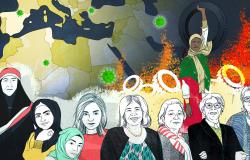How the Global Feminist Movement can Recover from COVID-19

This OpenDemocracy article is part of their series for the annual and global 16 Days of activism against gender-based violence published in collaboration with the Women Human Rights Defenders Middle East and North Africa (WHRDMENA) coalition as part of its #SheDefends yearly campaign. The articles reflect on the past, present and future of feminist movements and the meaning of global solidarity.
The intense weight of isolation that we have all experienced with the COVID-19 pandemic has created a major rupture that needs repairing. For the global feminist movement, which has historically thrived through connectedness, the damages were massive.
This is why the Women Human Rights Defenders Middle East and North Africa (WHRDMENA) coalition as part of its #SheDefends yearly campaign, together with openDemocracy will be publishing a series of articles throughout the annual and global 16 Days of activism against gender-based violence. These articles will reflect on the past, present and future of feminist movements and the meaning of global solidarity.
Before the pandemic, feminist movements were raising questions around important issues that threaten our progress. Key among these issues is the global rise of right-wing movements, especially – but not only – the one that brought about the Donald Trump administration, which caused damage to feminist agendas and their access to resources worldwide. Right-wing agendas are also heavily involved in the case of Palestine, with the instrumentalisation of false accusations of antisemitism to silence those who call for Palestinian inidiginous and human rights.
Just before the pandemic hit, we were witnessing how an ‘anti-rights’ discourse had spread from the Global North to the Global South. We felt isolated by the pandemic, not only in how it affected our ability to progress in our own movements, but in our ability to connect with each other and move across borders. It also cast a shadow over issues and movements that were already isolated from the mainstream feminist discourse, such as migration, refugees and the right of women to pass nationality onto their families.
This ‘anti-rights’ agenda of the past years is the instigator behind the increased normality of profiling Arab students, as we will see in the articles published in this series.
Before the pandemic, we were witnessing a period of criminalizing Palestinian human rights. International spaces – including the UN – have not been welcoming to Palestinian activists and voices due to the fear of being attacked and labelled as an antisemitic. Ironically, despite the Palestinian uprising that spread across all of colonized Palestine in May, surprising the world, and the more sympathetic coverage of their protests in some nations around the globe, Palestinians remain largely excluded from international spaces – unable to speak about their struggle.
We want to understand and shift our perceptions of the successful Black Lives Matter movement in the US and elsewhere in the Global North as a continuous reminder that human rights violations are taking place in the Global North in ways that mimic those in the Global South.
Looking at these scenarios, we want to ask how we can imagine and create different futures and realities. We need to revisit some of the issues that have threatened our existence as feminists, and as movements that are centered around human rights, in the past few years.
The ‘16 Days of activism against gender-based violence’ provides the right context to revisit these issues. This is why we have invited critical and important voices to reflect on the Global North as a scene of human rights violations, and the criminalisation of Palestinian human rights and its implications. We also invited them to reflect on how the women human rights defenders (WHRD) movement can move forward despite the hijacking of our spaces as an article in the series will show, and taking lessons from the organising of WHRDs and feminists in Mesoamerica, in the context of COVID-19. These reflections in a year full of global challenges are also about the WHRDMENA coalition surviving the pandemic in a region that has witnessed the shrinking of spaces for activism, especially for women.
This collaboration between the WHRDMENA coalition and openDemocracy reflects the importance of having these conversations publicly, to reach organisers, activists, academics, and the wider public globally, and to create a space for the movement to work and reflect on its past, present and future.
Women Human Rights Defenders Middle East and North Africa is a coalition of defenders in the Middle East and North Africa Region which aims at consolidating ways to protect human rights defenders, shedding light on the violations against them, as well as offer support systems through advocacy, sharing experiences, knowledge, activities, and the production of knowledge and positive arrangements to challenge the culture of patriarchy and the hegemonic masculinity and discrimination against women in the different societies, as well as provide safe spaces to do that.
This first appeared on OpenDemocracy.
Image: The #SheDefends campaign launches during the '16 Days of activism against gender-based violence' - Women Human Rights Defenders Middle East and North Africa (WHRDMENA) coalition


